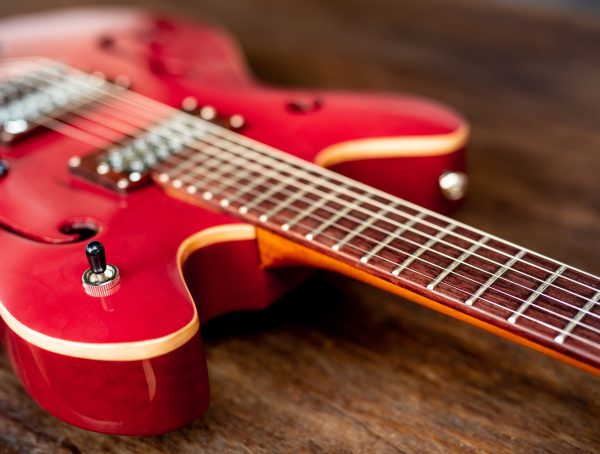There’s nothing more annoying than having your guitar strings break mid-session – you lose your flow and have to go through the process of restringing and retuning your guitar. Sometimes though, you come back to your guitar and the strings have seemingly self-destructed.
Can guitar strings actually break on their own without being played?
And the answer is yes. Guitar strings can break on their own due to wear and tear. The time that they’ve been on your guitar also plays into the likelihood of them breaking. And whilst it’s uncommon for strings to snap purely due to age and the time they’ve been strung on the guitar, it’s not unheard over a period of years and time to fray or wear extensively.
The full extent however as to whether guitar strings can break on their own is more complex than a simple yes or no – yes, they can break while they’re not being played, but their weakened state will likely be a result of a number of factors.
This article takes a look at the various ways that guitar strings can become weakened, and in time break, with some tips and advice on how you can increase their longevity.
Analysing the break
The first step to stopping your strings from breaking in the future lies in working out why they broke in the past. It’s reasonably easy to work out how and why your string broke – for example, if it breaks repeatedly at the bridge, it’s likely that there’s a sharp edge that needs softening.
If you’ve been rocking out riff after riff on the E and A string and they’re covered in dirt, and then they break, maybe you need to clean your strings a little more often.
Some causes, such as age, may be less obvious, but then you should also know when you last changed the strings, so age shouldn’t be a total surprise! Strings can just break of their own accord, but it’s far more likely that one of the causes below is behind it.
Rust and dirt
With metal guitar strings, as they age, they can become susceptible to oxidation, otherwise known as rust. Most guitar strings are nickel coated or nickel wound, which can help stave off rust, but if your guitar is kept in a humid environment, it is possible that in time they will succumb in the end.
Of course, one way to combat this is to keep your guitar in an environment of suitable humidity and temperature, however it’s equally important that you ensure your strings don’t get too dirty.
As you play the guitar, over time, the oils and grime from your fingers starts to build up on the strings. If this is left to build up without any remedial action, it both dulls the sound that the guitar produces and increases the likelihood that the strings will rust and weaken.
The best way to combat this is to regularly clean your strings with a good string cleaner, applied using a high quality microfibre cloth. If the cloth is of a poor quality, it can leave fibres behind in the coils of the strings, affecting play and making them more susceptible to dirt build up in the future.
If strings become too dirty and rusty, it is possible that they will break while you’re not playing them, but they will have to be in a bad state. By keeping them in a stable environment and cleaning them regularly, you can significantly lower the risk of an impromptu snap.
String type
The type of string that you buy will also influence how susceptible they are to breaking, but this is also a slightly counter intuitive subject. If you’re the kind of player who uses a lot of vibrato and you’re really into bending, a thinner string gauge will help this style of play really sound its best.
However, a thinner string will also wear out quicker, and be more likely to break. One solution is to use thicker strings, which will most probably wear at a slower rate, however thicker strings are obviously much less pliable, and less suited to vibrato-intensive styles of play.
Tuning
If you’re into alternate tuning, and like to play in higher keys a lot (without the use of a capo) you’ll be putting your strings under a lot more stress, and also leave them more susceptible to breaking while you’re not playing. There are a couple of ways to soften the impact that alternate tuning will have on your strings.
One is to use thicker, stronger strings, which will be able to handle the added tension better than thinner, more fragile strings. Another is to simply remember to retune your guitar to a normal pitch at the end of a session. If you leave it tuned high between sessions, the added strain could cause already weakened strings to snap overnight.
Sharp bridge and nuts
This can be especially common with electric guitars which have metal bridges; either over time, or straight from the manufacturer, sharp edges on the bridge can build up, which can rub on the string and cause it to weaken and then break.
A very simple way to remedy this is to take the strings off and use a fine sandpaper or small file to smoothen the groove where the string sits. Don’t take off too much metal, you don’t need to – just enough to get rid of the sharp and damaging edge! Another place where sharp edges can build up is the nut, the place where the strings rest at the top of the neck before they go into the tuning pegs. Check the nut for build ups of dirt and sharp edges, and clean it as required, or you may experience string breaks in this area in the near future!
Strings don’t last forever – change them!
Something to be aware of is the fact that your strings will not last forever, and if you don’t change them regularly, they will break. How often you change your strings is entirely dependent on your playing style and how regularly you play.
One fairly standard metric to go off of is to change them after every 100 hours of practice; if you practice every day for around an hour, that means changing them every three months. It’s easy to forget when you last changed them, so it may not be a bad idea to keep a diary, or a reminder on your phone.
If you liked this guide you may also enjoy:
More from Frequently Asked Questions
Can you play guitar with acrylic or long nails?
The short answer is yes, you can absolutely play the guitar if you have long nails, acrylic nails, fake nails... …
How Much Do Session Guitarists Earn? (2021 Poll Data)
There has been an argument for years now that the era of the session guitarist is long-gone. With nearly every …
How to protect your guitar from damage and theft
While your first guitar is unlikely to be worth more than a couple of hundred dollars, as you progress as …










